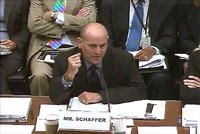-
New drone listens in on cell phone calls and hacks Wi-Fi networks

At this week’s annual Defcon security conference for hackers, two hobbyists will showcase their sophisticated unmanned Wi-Fi detecting, cell-phone eavesdropping spy drone; the drone was assembled using an old Army target drone that had been converted to run on electric batteries and is now equipped with an HD camera, eleven antennas, and a cigarette pack sized computer that is loaded with hacking tools
-
-
Detecting fake Web sites

A team of researchers develop a new — and more reliable — way to detect fake Web sites; the team developed five categories with thousands of cues, finding that the best results were attained when utilizing thousands of highly visible and also deeply embedded cues, such as placement, URL length, the number of links, characters types on the site and how thorough the site’s “frequently asked questions” section is detailed, among other features
-
-
Next generation firewall market to grow 24 percent annually through 2014
The global next-generation firewall market will grow at a CAGR of 24 percent over the period of 2010-14; the market is currently being driven by the increasing number and intensity of security threats on the Web
-
-
DHS warns utilities at risk from insider threats
Last week DHS warned critical infrastructure operators like chemical facilities, nuclear power plants, and electric utility companies that terrorists could be targeting major facilities from the inside; officials cautioned that “violent extremists have, in fact, obtained insider positions,” and that “outsiders have attempted to solicit utility-sector employees” for damaging physical and cyber attacks.
-
-
Cybersecurity legislation passes House Committee
Last week new cybersecurity legislation cleared its first obstacle passing through the House Science, Space, and Technology Committee; the bill would authorize the National Science Foundation and the National Institute of Standards and Technology (NIST) to establish standards across federal agencies as well as research and education
-
-
After FBI arrests LulzSec announces more cyber mayhem
In response to the FBI’s arrest of several hackers, the recently disbanded hacking group known as LulzSec has vowed to return and the group says it will renew its attacks on corporations and government agencies; the announcement comes after U.S. authorities arrested sixteen people last week in relation to the groups’ previous attacks which included bringing down PayPal’s website after it suspended its service to WikiLeaks
-
-
Recent deluge of cyber attacks results in record spending
The deluge of high profile cyber attacks on major corporations and government entities like the U.S. Senate, the CIA, and Sony has driven a sharp increase in demand for cyber security experts; in the first six months of this year alone, cyber attacks and data breaches have cost U.S. companies approximately $96 billion, nearly the total for 2010; analysts project 2011 to be the busiest year yet with an estimated $75.6 billion in cyber security spending, surpassing last year’s record $63 billion
-
-
Deterring cyberwar, police gear and the law, guarding the guardians
Gen. James Cartwright, vice chairman of the Joint Chiefs of Staff, described the current U.S. cyberdefense policy as “too predictable”; he added that “[the current policy is] purely defensive. There is no penalty for attacking us now. We have to figure out a way to change that”; he said the new U.S. cyberdefense policy is the first step toward correcting current deficiencies; a Massachusetts company is selling local police forces a new iPhone app that scans a suspect’s iris and matches it to a national database of felons; there are questions about whether or not this app — which costs $3,000 — violates the Constitutional prohibition of unreasonable searches; the former mayor, the police chief, and member of the city council of a New Mexico border town have been charged with smuggling guns to the Mexican cartels; some of these guns have been linked to at least eight murders in Mexico
-
-
Combating counterfeit microchips // by Dr. James Hayward, Ph.D, Sc.D.
Dr. James Hayward, the chairman, president, and CEO of Applied DNA Sciences, argues that the U.S. government needs to do more to prevent corrupted microchips from entering U.S. computers that make it easier for hackers and foreign governments to infiltrate networks
-
-
Malware imported into U.S. on foreign-made components

A high level DHS official acknowledged that malware built into imported electronic components sold in the United States poses a serious threat to U.S. economy and security; he also said it was a complex threat which the federal government has been trying to address in different ways; Greg Schaffer, acting deputy undersecretary for the National Protection and Programs Directorate at DHS, said the threat is “one of the most complicated and difficult challenges we have”
-
-
AntiSec hacks IRC Federal, posts passwords online
Last Friday, AntiSec, a prominent hacking group, announced that it had successfully infiltrated the servers of IRC Federal; the company has contracts with several major government agencies including the Department of Justice, the Army, Navy, and NASA; in an announcement on their website, AntiSec wrote, “We laid nuclear waste to their systems, owning their pathetic Windows box, dropping their databases and private emails, and defaced their professional looking website”
-
-
Creating genetic replacement for oil
Scientists previously established that oil and coal have their roots in the organisms that lived on the planet over 500 million years ago, but researchers only are sure of one organism that directly contributed to these natural resources — that organism is the algae Botryococcus braunii; this algae is very slow growing, so it is not necessarily a good source for biofuels; scientists offer an alternative
-
-
Critical vulnerability found in Apple iPhones and iPads
Apple is scrambling to develop a fix for a software vulnerability that leaves its iPhone, iPad, and iPod Touch devices susceptible to hackers; according to Germany’s Federal Office for Information Security, which discovered the critical software vulnerability, hackers can steal confidential data from the devices without the user even suspecting it by exploiting a flaw in the program that allows users to “jail-break” their devices and run non-Apple software
-
-
Foreign made chips could be allowing hackers into U.S. networks
Foreign-made computer parts could be manufactured with flaws or viruses that make it easier for hackers to later infiltrate U.S. computer networks; last week before the House Oversight and Government Reform Committee, Greg Schaffer, DHS’s acting deputy undersecretary national protection and programs director, admitted that some foreign chips are being made with security vulnerabilities
-
-
Top hackers to teach children at DEFCON Kids

At an upcoming gathering of some of the world’s most talented hackers, children will have the opportunity to learn hacking skills from the best;DEFCON, the infamous annual gathering of hackers, will hold DEFCON Kids for the first time; the decision to teach children hacking skills is controversial and is even drawing criticism from members within the DEFCON community
-
More headlines
The long view
Researchers Develop AI Agent That Solves Cybersecurity Challenges Autonomously
New framework called EnIGMA demonstrates improved performance in automated vulnerability detection using interactive tools.
